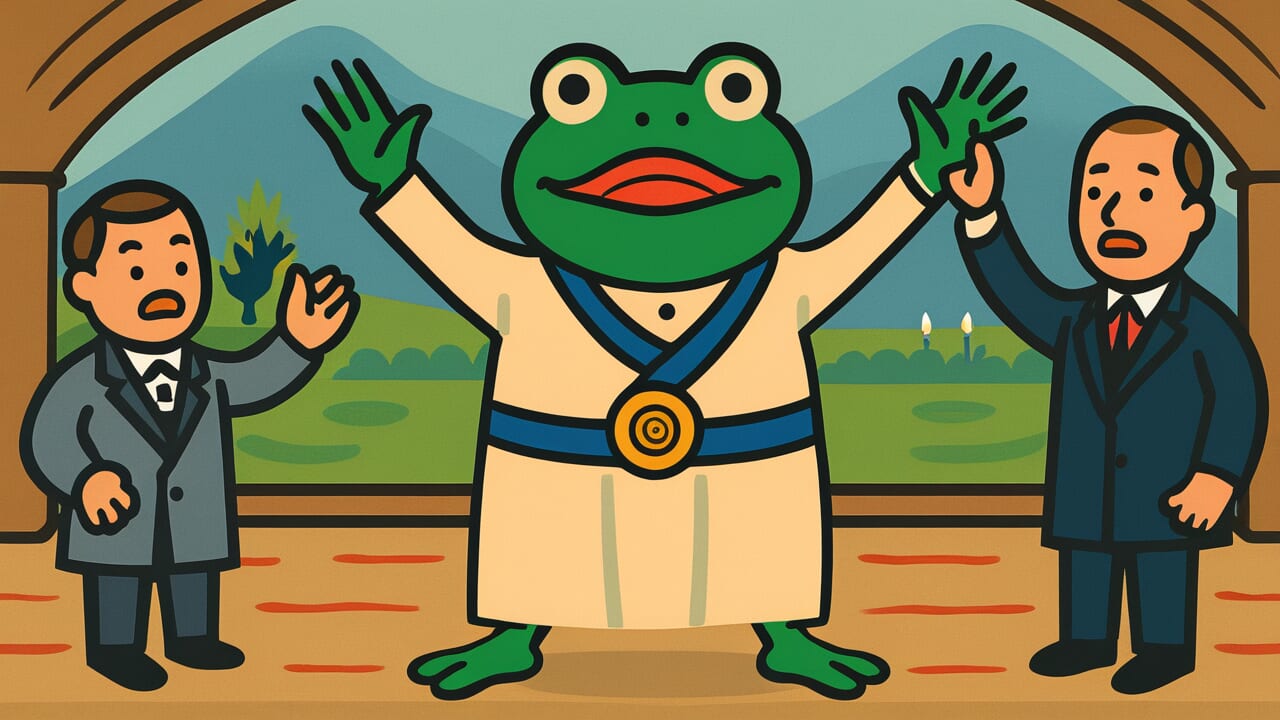How to Read “Explaining etiquette to an angry frog”
Dogaeru ni shiki su
Meaning of “Explaining etiquette to an angry frog”
“Explaining etiquette to an angry frog” teaches that even small acts of courage or effort deserve recognition to boost morale. When a frog puffs up its body to face an enemy, its strength may be limited, but its courage is real.
By treating such small courage with ceremony and respect, you can raise the spirits of an entire organization.
This proverb is especially used as a lesson for leaders and those in positions of authority. It emphasizes the importance of noticing and properly evaluating the small achievements of subordinates and juniors.
When people feel their efforts are recognized, they become motivated to work even harder. On the other hand, if they feel no one notices their hard work, their enthusiasm will fade.
Even today, this wisdom holds unchanging value in organizational management and educational settings.
Origin and Etymology
No clear written records remain about the origin of this proverb. However, we can make interesting observations from the structure of the phrase itself.
“Dogaeru” means an angry frog. Frogs are small creatures, but they have a habit of puffing up their bodies to intimidate enemies when threatened.
This appearance is desperate and brave, but their actual strength is minimal.
“Shiki su” means “to hold a ceremony” or “to show respect with formality.” In other words, this proverb expresses the seemingly mismatched act of “holding a ceremony for an angry frog.”
Why would anyone hold a ceremony for the small courage of a frog? This is thought to connect with ancient Chinese military philosophy.
A leader who formally recognizes and praises even small achievements can raise the morale of the entire group. This is strategic wisdom.
By using the familiar creature of a frog as an example, the proverb conveys an easy-to-understand lesson. No matter how small someone’s existence, their efforts should never be taken lightly.
This expression contains both a warm regard for the weak and small, and practical wisdom for managing organizations.
Usage Examples
- The new employee’s suggestion was small, but with the spirit of explaining etiquette to an angry frog, I praised it in front of everyone
- I want to properly acknowledge even my child’s small challenges, with the mindset of explaining etiquette to an angry frog
Universal Wisdom
The proverb “Explaining etiquette to an angry frog” contains deep insight into human dignity and the essence of organizations.
Everyone has a fundamental desire to have their existence valued. This is a thirst of the heart common to all people, regardless of position or ability.
The image of a small frog desperately puffing up its body represents each of us facing the world with our own best effort.
What this proverb teaches is the true nature of the power to move people. Not commands or force, but recognition and respect light the fire in people’s hearts.
Praising small efforts is not just kindness. It is strategic wisdom that energizes an entire organization.
In places where one person’s small courage is recognized, new challenges emerge one after another. Conversely, in places where all efforts are ignored, people shrink back and do only the bare minimum.
Our ancestors deeply understood this mechanism of human psychology.
This wisdom has been passed down through the ages because human nature does not change. We are beings who gain strength from recognition and lose it from being ignored, now as in the past.
When AI Hears This
When we analyze the behavior of a frog showing anger toward a snake from an ecological perspective, an interesting problem emerges. This is a “response where cost and return don’t balance.”
In animal behavior studies, even threatening behavior has an energy cost. Acts like puffing up the body or making sounds consume metabolic energy.
What’s important here is that “asymmetry in the meaning of victory” exists between predator and prey. Canadian biologist Dawkins pointed out that rabbits can run faster than foxes.
This is because foxes only lose dinner, but rabbits lose their lives. In other words, prey always face evolutionary pressure to run at 100 percent capacity.
The same structure exists in the frog-snake relationship. For a snake, one frog is just one meal option among many. But for the frog, it’s a life-or-death moment.
In this situation, expressing the emotion of anger wastes energy that should be used for effective strategies like fleeing or playing dead.
From an evolutionary biology perspective, individuals showing the half-hearted response of intimidation toward opponents with overwhelming size or predatory ability differences would have been easily eliminated.
In the survival competition, individuals who chose immediate action over emotional expression—who “just ran away”—would have left more descendants. This proverb succinctly expresses meaningless resistance that evolution would not permit.
Lessons for Today
What this proverb teaches us today is the importance of making recognition a daily habit.
In workplaces and homes alike, we tend to focus only on big achievements. However, big achievements are born from countless small efforts accumulated over time.
A new employee’s first small idea, the moment a child challenges something difficult, a partner’s tiny gesture of consideration—these are small acts of courage. Not overlooking them and properly expressing recognition in words builds trust and promotes growth.
Modern society especially tends to emphasize efficiency and results, often neglecting process and effort. But people are not machines.
Only when recognized do they find the courage to take the next step.
Around you, there are surely people mustering small acts of courage. Noticing that courage and offering words of recognition is not something special.
Anyone can do it. And the accumulation of such small acknowledgments eventually creates big changes.
The power to nurture people is actually in each of our hands.



Comments